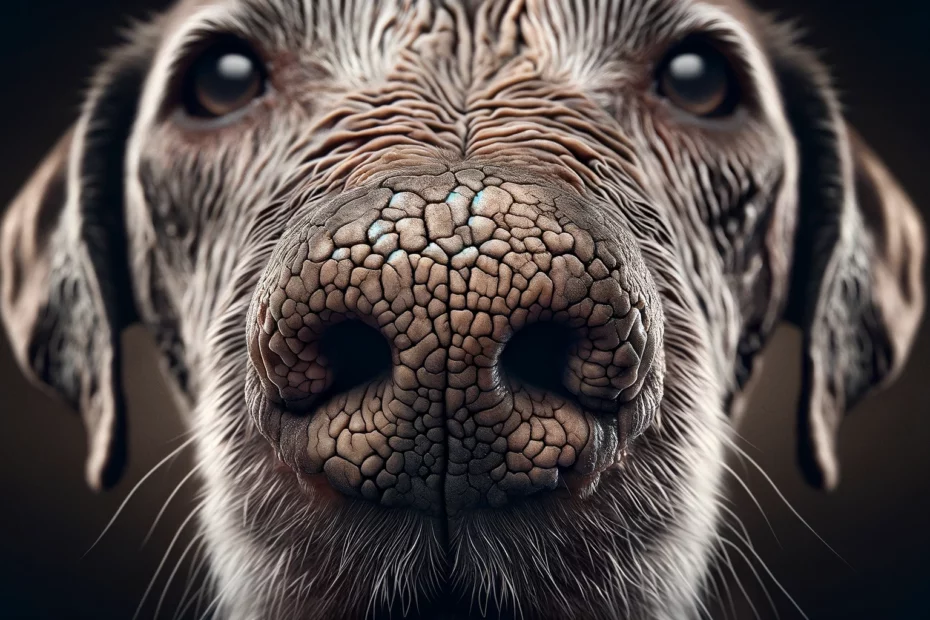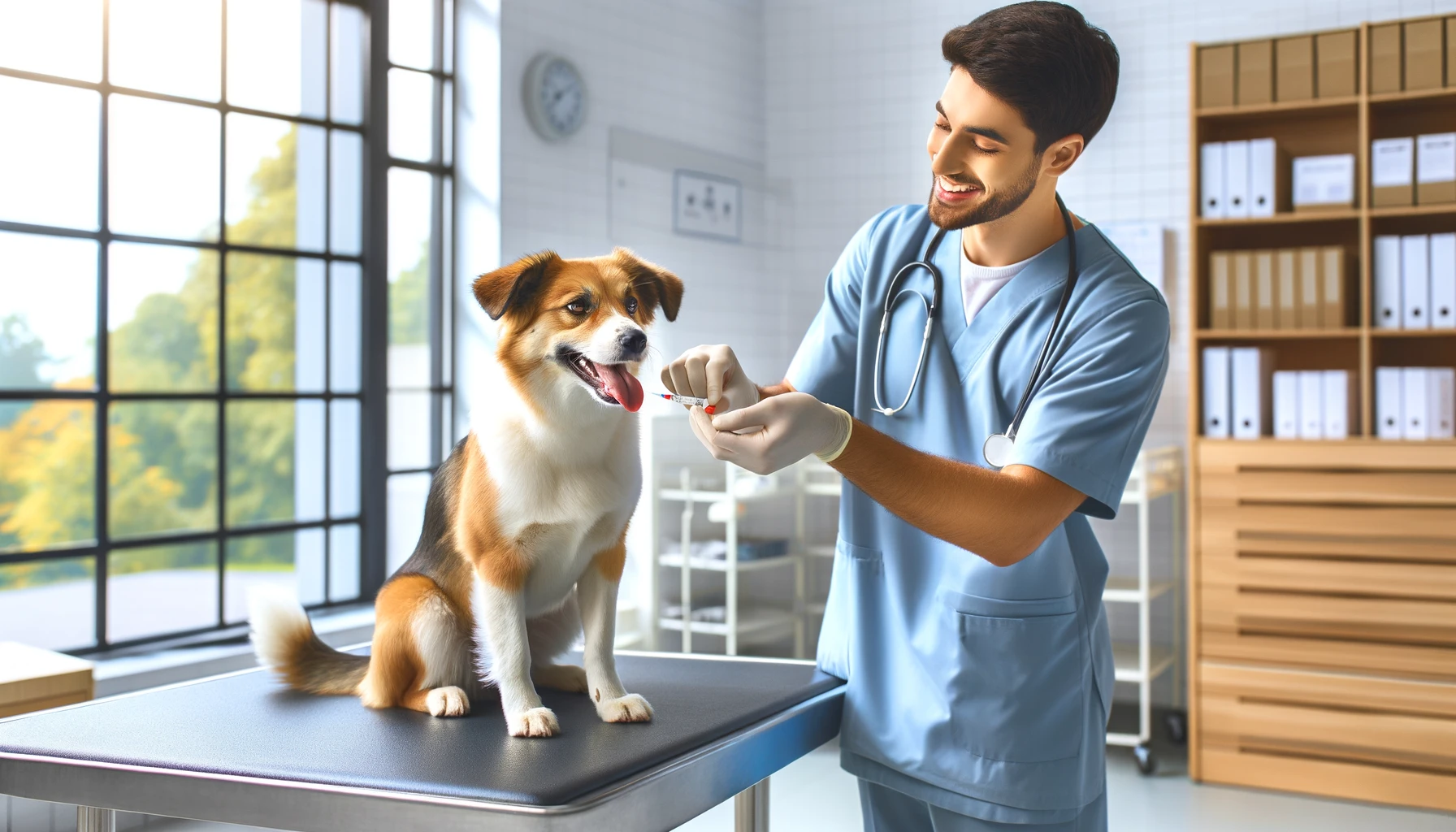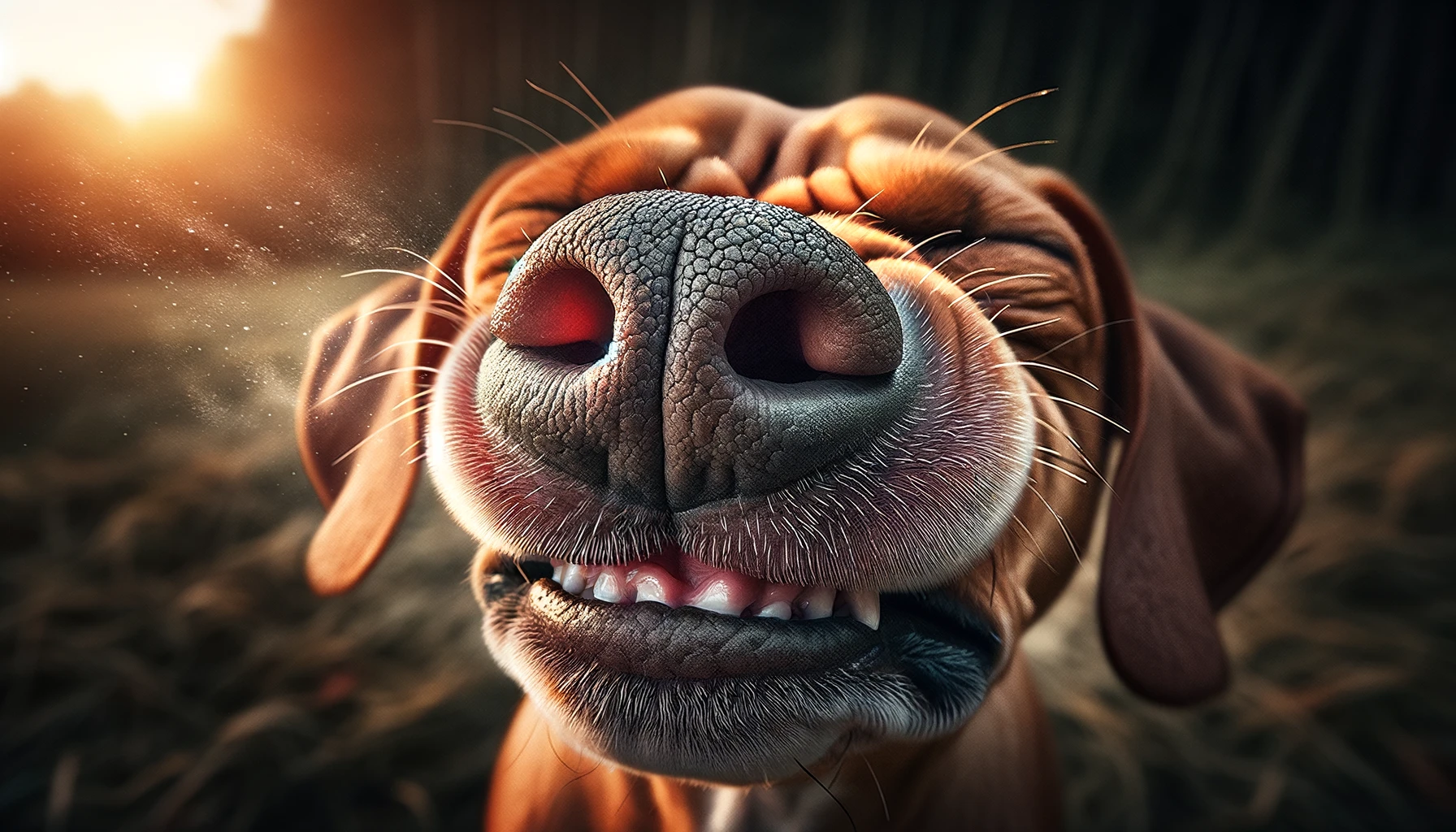Do you ever wonder if a dry nose on your dog means something is wrong? Well, guess what? Not necessarily! There can be multiple reasons why your furry friend’s nose is dry.
It could be due to exposure to the elements, dehydration, or even just a natural occurrence as your dog gets older. Some breeds with shorter snouts or blocked tear ducts may also have dry noses.
However, it’s crucial to keep an eye out for other symptoms and consult a vet if the dryness persists or if there are any other concerning signs.
So, don’t jump to conclusions just yet – let’s explore the various possibilities together!
Key Takeaways
- A dry nose in dogs can have various causes, including exposure to the elements, dehydration, breed-related factors, allergies, and autoimmune diseases.
- Factors that can affect a dog’s nose moisture levels include humidity, allergies, and the importance of maintaining proper humidity levels.
- Adequate moisture in the air is essential to prevent dryness and potential irritation and infections in a dog’s nose.
- Allergens can trigger a dry nose in dogs, leading to inflammation, decreased mucus production, and potential issues with the sense of smell. Consulting a veterinarian is important for proper diagnosis and treatment.
Common Causes of a Dry Dog Nose
If your dog has a dry nose, there are several common causes that could be responsible. Exposure to the elements, such as sun, wind, cold, and heat, can cause a dog’s nose to become dry.
Dehydration from strenuous exercise is another potential culprit. Certain breeds with shorter snouts or blocked tear ducts may naturally have drier noses. Additionally, allergies, sunburn, and autoimmune diseases like Lupus and Pemphigus can contribute to a dry dog nose.
It’s important to pay attention to other symptoms as well. If a dry nose is accompanied by excessive mucus, fever, coughing, sneezing, discolored gums, or a warm body temperature, it may be necessary to seek veterinary attention.
A veterinarian can help determine the underlying cause of the dry nose and provide appropriate treatment. It’s important to prioritize your dog’s health and consult with a professional to ensure their well-being.
Factors That Can Affect a Dog’s Nose Moisture Levels
Humidity plays a significant role in determining your dog’s nose moisture levels. When the air is dry, it can cause your dog’s nose to become dry as well.
Additionally, allergies can also contribute to nose dryness in dogs.
Humidity and Nose Moisture
Wondering how humidity affects your dog’s nose moisture levels?
Humidity plays a significant role in maintaining your dog’s nose moisture. When the air is dry, it can cause your dog’s nose to become dry and cracked. This can be uncomfortable for your furry friend. Dryness in the nose can also make it more susceptible to irritation and infections.
On the other hand, when the air is humid, it helps to keep your dog’s nose moist and healthy. Adequate moisture in the air prevents the nose from drying out and cracking. It’s essential to provide a comfortable environment for your dog by maintaining proper humidity levels.
Consider using a humidifier during dry seasons or in dry climates to help keep your dog’s nose moist and prevent dryness.
Allergies and Nose Dryness
To maintain optimal nose moisture levels in your dog, it’s important to be aware of the factors that can contribute to dryness, such as allergies.
Allergies can affect a dog’s nose moisture levels due to the immune system’s response to allergens. When a dog is exposed to allergens, such as pollen, dust mites, or certain foods, it can trigger an allergic reaction that may lead to a dry nose.
This dryness can be caused by inflammation and irritation in the nasal passages, which can result in a decrease in mucus production. A dry nose can affect a dog’s sense of smell, as the moisture in the nose helps to capture scent particles.
If you suspect that your dog’s dry nose is related to allergies, it’s important to consult with a veterinarian for proper diagnosis and treatment.
When a Dry Nose May Be a Sign of Illness
Monitoring your dog’s dry nose can be crucial in identifying potential signs of illness. While a dry nose alone isn’t typically a cause for concern, it can sometimes indicate an underlying health issue in dogs. One possible cause of a dry nose is allergies. Allergies can lead to excessive mucus production, which can in turn cause the nose to become dry.
Autoimmune diseases can also contribute to dryness in the nose. If your dog’s dry nose persists or worsens, it’s important to keep an eye out for accompanying symptoms such as excessive mucus, fever, coughing, or discolored gums. These symptoms may indicate a more serious underlying condition that requires veterinary attention.
Additionally, factors such as age-related dryness, breed characteristics, and environmental factors should be taken into consideration when evaluating your dog’s nose health.
Regular observation and awareness of your dog’s overall health are key to ensuring their well-being. If you have any concerns about your dog’s dry nose, it’s always best to consult a veterinarian for professional advice.
Breeds Prone to Dry Noses
If you own a dog, you may have noticed that certain breeds are more prone to dry noses. Breeds with shorter snouts, like Pugs and Bulldogs, tend to have dry noses because they’ve difficulty licking them. Their tongues can’t reach their noses as easily, leading to dryness.
Additionally, breeds with blocked tear ducts, such as Shih Tzus, may also experience dry noses. The tears that normally keep the nose moist are unable to flow properly, resulting in dryness.
Labrador Retrievers can develop hereditary nasal hyperkeratosis, a condition that causes excessive skin growth on the nose, leading to dry and cracked noses. This condition is more prevalent in certain breeds. Senior dogs, including breeds like Golden Retrievers, are prone to nasal hyperkeratosis as well.
Finally, dogs with hypothyroidism, including breeds like Doberman Pinschers, can have dry noses as a symptom of the condition.
It’s important to be aware of these breed tendencies to better understand and address dry nose issues in your dog.
How to Keep Your Dog’s Nose Healthy and Moisturized
To keep your dog’s nose healthy and moisturized, consider using natural nose moisturizers specifically designed for dogs. These balms can help prevent dryness and provide essential moisture to keep your dog’s nose in optimal condition.
Additionally, make sure your dog stays hydrated by providing fresh water and monitoring their water intake, as dehydration can contribute to a dry nose.
Natural Nose Moisturizers
To maintain your dog’s nose health and moisture, using natural nose moisturizers is essential. If your dog’s nose is dry, it doesn’t necessarily mean there’s a health issue, but it’s important to keep it moisturized.
Natural nose moisturizers, such as canine nose balms, can help alleviate minor dryness and prevent cracking. These moisturizers are especially beneficial if your dog’s nose has been exposed to dry, warm environments or if they’ve become dehydrated after exercise.
Regular licking from your dog may help keep the nose moist, but using natural nose moisturizers can provide additional support. Remember, if your dog’s nose has deep cracks or sores, it’s best to consult a veterinarian for proper treatment.
Importance of Hydration
Ensure your dog’s nose stays healthy and moisturized by prioritizing hydration. A dry nose on a dog can indicate dehydration, which emphasizes the importance of keeping your furry friend well-hydrated.
Dogs can become dehydrated from strenuous exercise, so make sure they’ve access to plenty of fresh water during and after physical activity. Additionally, older dogs may experience age-related dryness, so it’s crucial to monitor their hydration levels closely.
Dry, warm environments can also contribute to a dry nose, so maintain proper indoor humidity levels to prevent moisture loss. Certain breeds with short snouts or blocked tear ducts are more prone to dry noses, so be sure to provide them with breed-specific care and attention to their nasal health.
Regular observation and awareness of your dog’s nose moisture is essential for their overall wellness and hydration status.
Common Causes of Dryness
Keep your dog’s nose healthy and moisturized by implementing these simple steps.
A dry nose on a dog can be caused by various factors. Exposure to the elements, such as sun, wind, cold, or heat, can lead to dryness in the nose. Dehydration, whether from strenuous exercise or illness, can also contribute to a dry nose in dogs. Certain breeds with shorter snouts or blocked tear ducts may be more prone to dryness in their noses. Additionally, allergies, sunburn, and autoimmune diseases like Lupus and Pemphigus can cause dryness.
While a dry nose alone isn’t usually a cause for concern, if it persists or is accompanied by other symptoms, it’s important to consult a vet to ensure your dog’s overall health.
Signs That You Should Bring Your Dog to the Vet
If your dog’s dry nose is accompanied by signs of severe dehydration, it’s important to contact a vet for evaluation and treatment. While a dry nose alone isn’t typically a cause for concern, certain signs indicate that medical attention is necessary.
Look out for symptoms such as excessive mucus, fever, coughing, sneezing, and discolored gums. These accompanying symptoms may suggest an underlying condition that requires veterinary intervention. Additionally, severe allergic reactions or persistent and worsening dry nose shouldn’t be ignored.
Monitoring your dog’s symptoms and seeking veterinary advice when necessary is crucial. Trust your instincts as a pet owner and be aware of your dog’s overall health. Pay attention to any sunken eyes, nasal discharge, unusual color changes, or loss of normal nose appearance. These signs indicate that your dog may be experiencing severe dehydration or other serious health issues that warrant a trip to the vet.
Remember to observe your dog regularly and seek professional guidance if needed.
Remedies and Treatments for a Dry Dog Nose
Using a canine nose balm can help alleviate minor dryness and cracking on your dog’s nose. These balms are specifically formulated to moisturize and protect your dog’s nose, providing relief from dryness and preventing further damage. Look for a balm that contains natural ingredients like shea butter, coconut oil, or beeswax, as these can help soothe and hydrate your dog’s nose.
In addition to using a nose balm, there are other remedies and treatments that can help with a dry dog nose. Keeping your dog well-hydrated is important, as dehydration can contribute to dryness. Make sure your dog has access to fresh water at all times.
You can also try using a humidifier in your home to add moisture to the air, which can help prevent your dog’s nose from drying out. If your dog spends a lot of time outdoors, consider providing shade or a sheltered area to protect their nose from the sun and wind.
If your dog’s dry nose is accompanied by deep cracks or sores, it may be necessary to seek veterinary guidance. These more severe cases may require medical treatment, such as antibiotics or topical ointments, to heal properly.
Frequently Asked Questions
Should I Worry if My Dog’s Nose Is Dry?
Don’t panic, but don’t ignore a dry nose. Pay attention to other symptoms to assess your dog’s overall health. If necessary, consult a vet. Regular observation is key to determining if further action is needed.
Can Stress Cause a Dogs Nose to Be Dry?
Stress can dry out a dog’s nose, but it’s crucial to look for other symptoms to assess overall health. To keep your dog’s nose moisturized, try remedies like coconut oil or a humidifier. Remember, stress can impact a dog’s well-being, so find natural ways to relieve it.
Is a Wet Dog’s Nose Good or Bad?
A wet dog’s nose is generally good because it helps them smell better, regulate body temperature, and understand their surroundings. However, a dry nose can be caused by dehydration, weather, or certain medications.
Can I Put Vaseline on My Dog’s Nose?
You can put Vaseline on your dog’s nose to moisturize and protect it. It’s one of the natural remedies for a dry dog nose. Keep an eye out for signs of a healthy nose and make sure to moisturize regularly.
Conclusion
In conclusion, a dry nose on a dog can have various causes, such as exposure to the elements or dehydration. While it may not always indicate a problem, it’s important to monitor for other symptoms and consult a vet if the dryness persists or is accompanied by concerning signs.
Certain breeds with shorter snouts or blocked tear ducts are more prone to dry noses. To keep your dog’s nose healthy and moisturized, consider using remedies and treatments recommended by a veterinarian.
Stay vigilant and prioritize your dog’s well-being.






